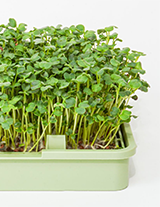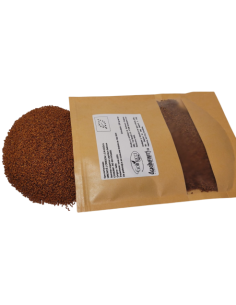
Antioxidants - collective term for substances that help protect the body against cell damage and fat oxidation. Both sprouts and microplants are rich sources of antioxidants, which can help protect our cells from oxidative stress and free radical damage.
When seeds are germinated, the number of antioxidants can increase by up to 2,000%. This is partly due to the increase in vitamins.
In terms of antioxidants, sprouts and microplants can have a different composition, depending on the type of plant. Some examples of antioxidants found in sprouts and microplants include:
- Vitamin C: Broccoli, alfalfa and mustard sprouts and microplants are rich sources of vitamin C, a powerful antioxidant.
- Vitamin E: Wheat and barley sprouts and microplants are good sources of vitamin E, another powerful antioxidant.
- Carotenoids (Vitamin A Precursor): Carrot and beetroot sprouts and microplants are rich sources of carotenoids, such as beta-carotene, which can help protect cells against free radical damage.
- Flavonoids: Mungo bean, lentil and chickpea sprouts and microplants are rich sources of flavonoids, which have antioxidant and anti-inflammatory effects.
- Other compounds: Sprouts and microplants may also contain other compounds with antioxidant properties, such as alpha-lipoic acid and selenium.
The increase in antioxidants, whether we are talking about sprouts or microplants, is also the result of higher amounts of phenols, also known as phenolics. Phenolics are substances that are found in all vegetables and provide taste, smell and colour. Phenolic substances are considered beneficial in the fight against cardiovascular disease, cancer, diabetes and allergies, due to their anti-inflammatory, antioxidant, cholesterol-lowering and hypoglycaemic properties.

 Microgreens
Microgreens

























